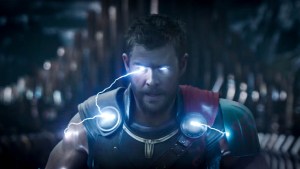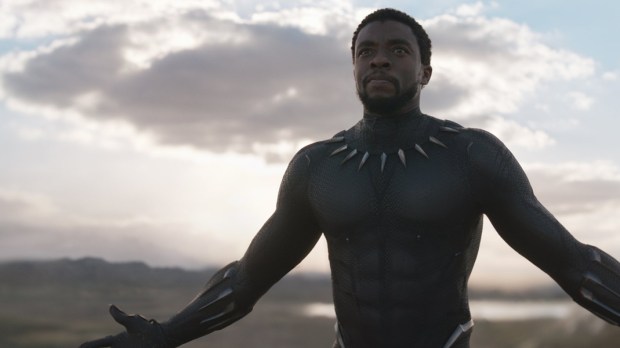Black Panther, Disney/Marvel’s latest superhero film, debuted this weekend to packed houses and will probably earn enough money to buy a small European state. Some experts are predicting the movie could make more than $165 million this weekend in North America alone.
Why so popular? Lots of reasons. People haven’t tired of watching superheroes on the big screen, and Marvel’s movies have been surprisingly good. (Black Panther currently holds a 98 percent “freshness” rating on Rotten Tomatoes.) Moreover, this particular superhero flick feels pretty relevant: On the heels of #BlackLivesMatter, Black Panther pits the African prince and protector Black Panther (Chadwick Boseman) against Erik Killmonger (Michael B. Jordan), who nurses an insatiable hatred for “colonial” oppressors and all their ilk. It’s not just a clash of titans, but of ideologies, with a peace-loving superhero on one side and a man gunning for racial war on the other.
T’Challa is no Christian superhero. His powers, the movie says, come from the panther god Bast. But setting that aside (and steering well clear of spoilers), the guy shares some core values with Christianity.
T’Challa is the newly crowned leader of Wakanda, an incredibly rich, unimaginably advanced country built on the nigh-magical substance Vibranium. But here’s the thing: For most of its history, Wakanda has presented itself as a third-world backwater as an effort to protect itself, its wealth and its way of life. But changes are afoot: T’Challa’s ex girlfriend, Nakia (Lupita Nyong’o) wants to open the country up to the rest of the world — to be its light and salt, if you will.
This essential tension at play here has been central to the entire history of the Christian Church, one that we’ve collectively dealt with in very different ways. Closing ourselves off from the world has its own logic and appeal: some monasteries and convents have been built on just that principle, and one could argue that some strains of modern Christianity try to hermetically seal themselves off from a world that sometimes seems so hostile. But the Church — especially, I’d say, the Catholic Church — has also historically reached out to heal that hurting world, through its schools and hospitals, its charity work and its missionaries. And it sometimes risks a great deal of danger to do so.
Is this theme, and others found in Black Panther, an intentional echo of Christianity? Probably not. But it is interesting to note that much of Black Panther’s cast is Christian — so much so that actress Sope Aluko (who plays Shaman in the movie) said that so many of her fellow stars were sharing their religious experiences on set that “it was almost like church.”
And purposeful or not, God can use almost anything to make Himself better known to those who need Him. Even, sometimes, a silly superhero movie.
But I think there’s something else in play: Black Panther and Marvel’s other superheroes, often unintentionally, allow audiences to get a hint of something supernaturally transcendent. These superheroes don’t just have godlike powers: They reflect, imperfectly, a bit of true God behind them.
Take, for instance ….
Iron Man
Tony Stark, the self-proclaimed “genius billionaire playboy philanthropist” who moonlights as a metal-suited superhero, played by Robert Downey, Jr., begins the original Iron Man movie as a boozy, self-absorbed gloryhound — a prototypical sinner, really. But when he’s undone and nearly killed by his own sinful past (the high-tech weapons his own company makes and sells), he is remade into someone, or something, else.
“I shouldn’t be alive, unless it’s for a reason,” Tony later says, voicing a newfound belief in a power beyond himself. Sure, Tony’s still far from perfect, but he’s better than he was — a sinner like we all are, trying to improve ourselves, day by day. He becomes a hero — one literally powered by a new power source set next to his old, damaged heart. And one need not look too hard at the jets on Iron Man’s hands and feet to see the signs of stigmata.
Captain America
If Tony Stark had the raw material to make himself into a superhero — brains, ability, unimaginable wealth — Steve Rogers (Chris Evans) had hardly anything. This old-school guy from Brooklyn wanted nothing more than to join the military and fight Nazis. But no one wanted this short kid with a long list of health problems. Only one person, the brilliant Dr. Abraham Erskine (Stanley Tucci), looks past Steve’s scrawny arms and sallow face to see the heart of a hero, and he eventually drafts him. “You must stay who you are,” Erskine tells him. “Not a perfect soldier, but a good man.”
Hardly any biblical hero was branded as such from the start: Despite Steve’s outsized abilities as Captain America — the strength, the speed, the nifty shield — he retains a natural humility, and he never loses sight of creation’s ultimate authority, and his own ultimate author. In The Avengers, when someone describes superhero Thor and his evil brother Loki as “basically gods,” Cap rejects the description. “There’s only one God, ma’am,” he says. “And I’m pretty sure He doesn’t dress like that.”
Thor
While Thor (Chris Hemsworth) is indeed described in the movies and comics as the “god of thunder,” his story arc has as almost as many echoes of Judeo-Christian thought as it does of Norse myth. They’re just a bit harder to spot.
Just take a look at the Thor we meet even in last year’s Thor: Ragnarok — the silliest of superhero movies. Thor thinks pretty highly of himself from the get-go. But as the film moves on, everything that makes him special is slowly stripped away. His hammer’s destroyed. His hair is cut off. He’s forced to entertain the masses. Why, he even loses an eye.
Does that feel at all like Samson to you? It sure reminds me of that biblical superhero who was eventually shorn, blinded and humbled.

Read more:
If you don’t like ‘Thor: Ragnarok,’ blame St. Boniface

